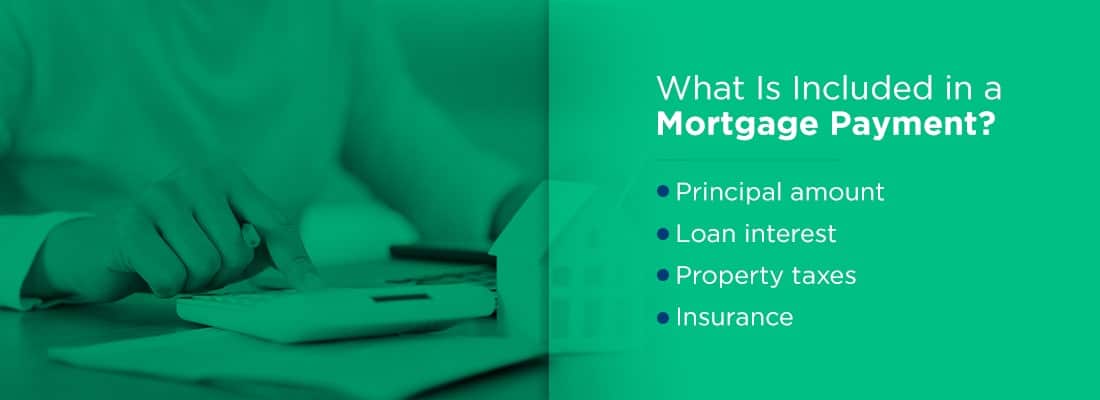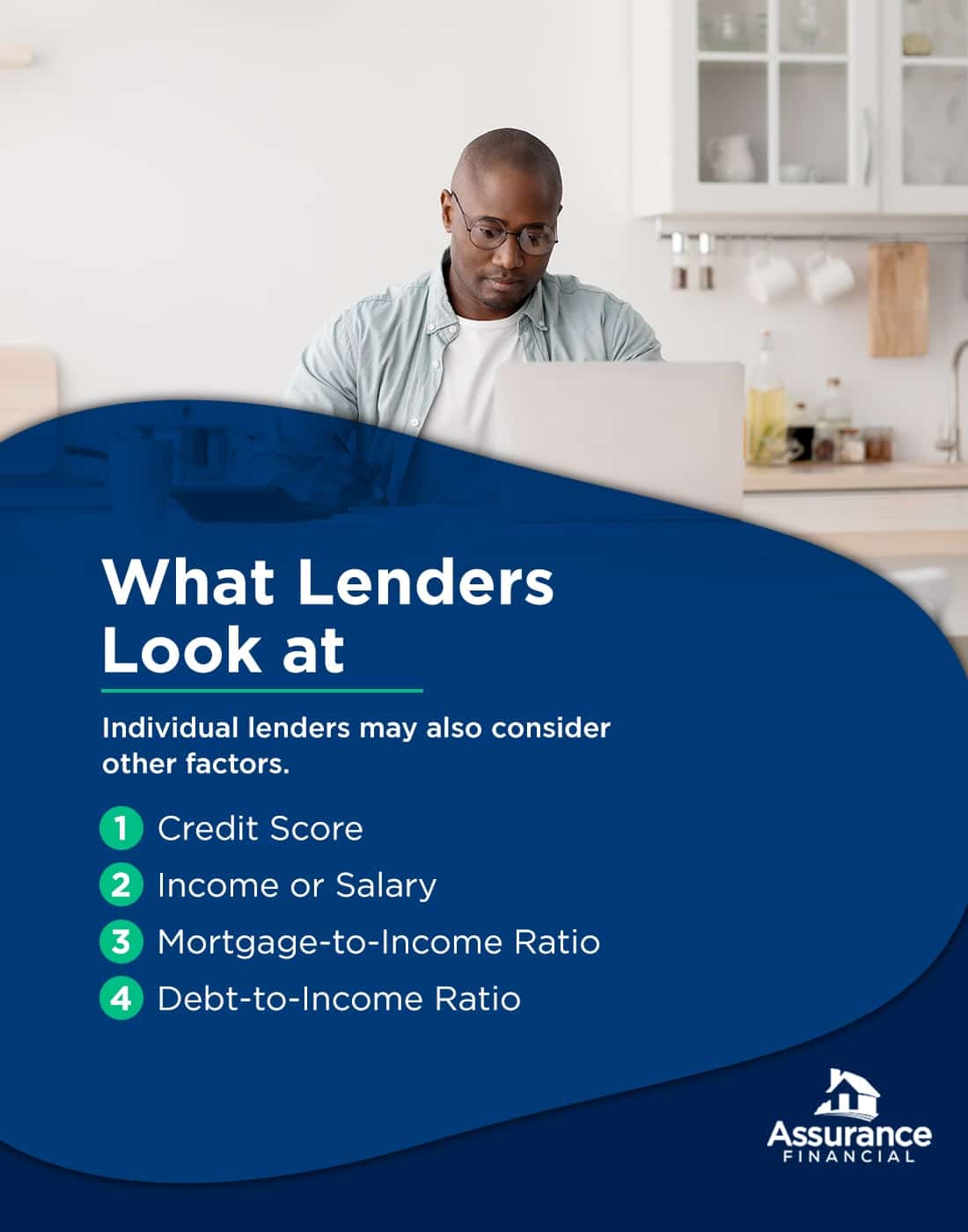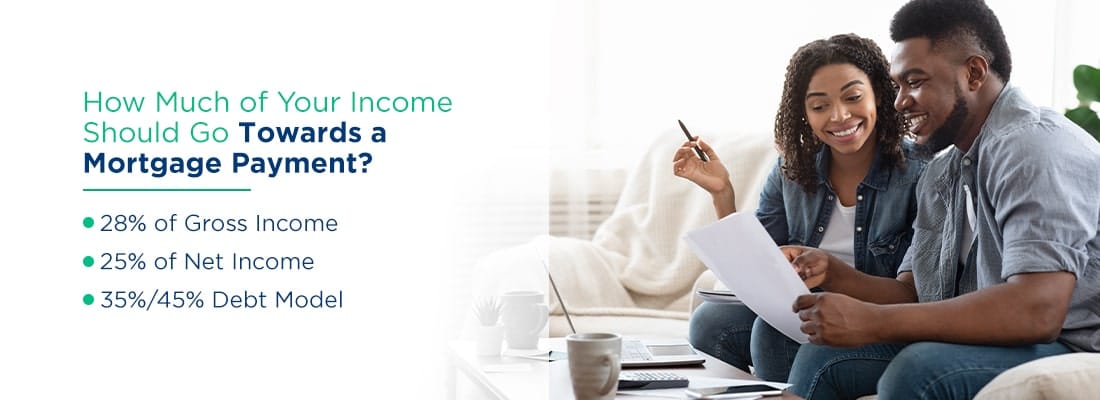Most people dream of owning a home, whether it’s a small one in the city or a rural one with a huge property. However, affording a home is difficult and saving up enough money can be challenging. Obtaining a mortgage is a big step, and you likely have many questions. One important thing you will need to know is how much of a mortgage you can afford based on your income. You can use a few different guidelines to discover what percent of your net income should go toward mortgage payments each month.

What Is Included in a Mortgage Payment?
The first thing you need to know is what exactly is included in the monthly mortgage payment. Your monthly mortgage payment is usually made up of four components:
- Principal amount
- Loan interest
- Property taxes
- Insurance
This means that your monthly payment may be more than you are expecting since it includes more than just your loan.
1. Principal
The principal is the portion of the mortgage payment that goes to the actual repayment of the amount loaned. Loans are structured so that the repayment of the principal is low at first but then increases in later years.
This means most of your money goes towards interest at the beginning of paying a mortgage. At the end of your mortgage term, the amount of principal paid will add up to the amount loaned. For example, if you purchase a $200,000 home and put $40,000 down, your total principal would be $160,000.
2. Interest
Interest is the price you must pay for borrowing money. At the beginning of your mortgage term, you will pay more towards interest than the principal.
When you’re in the process of getting your mortgage, you will be able to see how much interest you will end up paying over the course of your loan. This can end up being a lot of money, but that’s the cost of obtaining a loan. Interest rates vary but are typically between 3% and 5%, sometimes more or less, depending on different factors.
3. Taxes
You pay your property taxes to local governments to fund things like schools, firehouses, police departments and other public works. They are based on your property’s value and local tax rates.
While property taxes are calculated each year, you can usually include them in your monthly payments. The lender holds the funds in escrow until the taxes are due. This allows you to pay your taxes over time rather than paying a large sum all at once.
4. Insurance
You may have to pay two different types of insurance. If you pay less than 20% on the down payment, you may be required to purchase private mortgage insurance. Since loans with low down payments are riskier, lenders want to be protected. Private mortgage insurance protects the lender if you stop making payments. If you want to avoid an additional monthly cost on your conventional loan, you must put down 20% or more.
You will also need homeowners insurance. Most mortgage companies will not let you purchase a home without it. It protects your home and finances in the event of a natural disaster, fire or accident at the property. You should consider home insurance even if you are not required to.
Other Important Mortgage Terms
The mortgage process is often confusing, and it’s even worse if you don’t understand some of the terms. These are a few of the important mortgage terms to know:
- Amortization: The process of paying off a loan is called amortization.
- Annual Percentage Rate (APR): The APR is the cost of taking out a loan.
- Assessed value: The assessed value of a home is the value the local tax agency places on it, regardless of the selling price. Property taxes are based on the assessed value.
- Cash to close: This term refers to the amount of money you will need to bring with you to closing.
- Default: If you stop making payments on the loan or are paying less than required, you are defaulting on your mortgage. This can lower your credit score and cause the bank to foreclose on your home.
- Equity: As you pay off your principal, you are gaining equity in the home. Equity is the difference between the home’s value and the amount you owe.
- Foreclosure: If you default on your loan, the lender will take control of the property and try to get the money owed by selling the house.
- Title: The title is the record of who owns and has owned the property.
What Lenders Look at
Lenders look at more than just your income to determine what mortgage you qualify for. Your down payment, credit score and income will all be considered in relation to the amount of the loan you are seeking. Individual lenders may also consider other factors.
Credit Score
Many factors go into your credit score, such as how long you’ve had credit, the amount of credit you have access to, your repayment history and more. Lenders always check your credit score to determine if you are a responsible borrower who will pay off the loan.
A higher credit score will allow you to get better rates on your mortgage. Usually, a score of 740 or higher will help you get the best mortgage rates available. If your credit score is lower than 630, you may end up paying a much higher rate if you qualify for the loan. If your credit score is too low, you may not qualify for a conventional loan at all. Learn how to build your credit to get a mortgage loan.
Income or Salary
Lenders will need to know what your income is. They have to ensure you make enough money to pay the mortgage and all your other expenses. Of course, a higher income will likely help you qualify for a bigger mortgage.
Mortgage-to-Income Ratio
Your mortgage-to-income ratio, sometimes called the front-end ratio, will be calculated. This ratio is the percentage of your gross income that you have to put toward your mortgage payment. Most of the time, this should be below 28%. However, some lenders may allow it to be higher.
Debt-to-Income Ratio
Your debt-to-income ratio, sometimes called the back-end ratio, is also important. This ratio considers all your debt, like credit card debt, auto loans, child support, student loans and other debts in relation to your income.
How Much of Your Income Should Go Towards a Mortgage Payment?
When considering how much you can spend on a mortgage, you will need to calculate your income. Find your monthly gross income and monthly net income, as you will need both these numbers to help with these calculations.
It’s important to note that the amount of mortgage you can afford depends on more than just your income, so these are just guidelines to help. You’ll notice that the numbers will end up being different depending on which calculation you use.
28% of Gross Income
One calculation to calculate how much of your income can go towards your mortgage payment is the 28% rule. This rule says that you should not spend more than 28% of your gross income on your mortgage payment. Gross income is your income before any deductions or taxes are taken out. Find your monthly gross income by reviewing your recent paystubs. Then, multiply that number by 0.28 to find the maximum you should be spending on your mortgage payment.
For example, if you make $4,000 a month before taxes, you multiply that by 0.28 to get $1,120. The amount of $1,120 would be the max amount someone making $4,000 a month could spend on the mortgage payment. If you make $10,000 a month before taxes, you would be able to spend up to $2,800 on the mortgage payment each month. Income greatly affects the amount you can afford.
25% of Net Income
Another calculation you can use to find how much of your income you can spend on your mortgage payment is the 25% method. This method allows you to use your net income rather than your gross income. When you use your post-tax income, you use 25% instead of 28%. Find your monthly net income and multiply that number by 0.25. That number is the max you should be spending monthly on your mortgage.
For example, if you make $3,200 a month after taxes, you would multiply $3,200 by 0.25. Using these numbers, you would be able to afford a mortgage payment of $800 a month. This method can vary greatly because taxes are different depending on where you live.
35%/45% Debt Model
Another helpful calculation is the 35%/45% model. For this one, calculate your total monthly debts including, the mortgage payment. You will also need your pre-tax income and after-tax income amounts. If your other debts are fairly low, this method allows you to allocate more money to your mortgage payment. This method also provides a range your debts should fall in.
Multiply your pre-tax income by 0.35 and your after-tax income by 0.45. For example, let’s say someone makes $4,000 a month before taxes, which ends up being $3,200 after taxes. They would multiply $4,000 by 0.35, resulting in $1,400. Then, they would multiply $3,200 by 0.45, which is $1,440. This means this person’s monthly debts, including their mortgage payment, should be between $1,400 and $1,440.
Learn About Other Types of Loans
Most of these guidelines are in relation to conventional loans, but you may qualify for another type of loan. There are a few mortgage programs that allow people with low credit scores or savings to still purchase a home. VA loans and FHA loans have less strict requirements than conventional loans, so it’s worthwhile to look into them if you don’t think you will qualify for a conventional loan.
VA Loan
If you are a veteran, active-duty service member, member of the National Guard or Reserve, surviving spouse of a veteran or prisoner of war, you may qualify for a VA loan. VA loans have lower down payment requirements than conventional loans and FHA loans. You may not need to put down a down payment at all. There is also no credit score requirement, and lenders consider many factors before making a decision.
FHA Loan
To qualify for an FHA loan, you need to meet several requirements. You need a credit score of at least 500, and you will also need to put down a down payment. If you have a high credit score, you may be able to put down as little as 3.5%. If you’re approved, you will need to pay for mortgage insurance. Learn more about VA loans and FHA loans.
USDA Loan
If you are unable to get other types of loans, you may be able to get a USDA loan. There are many requirements, but they are designed for low-income borrowers. There are both direct loans and USDA guaranteed loans. Learn more about USDA loans.
[download_section]
How to Lower Your Monthly Mortgage Payment
If your income is too low or your monthly debts are too high, you may have trouble obtaining a mortgage. However, there are a few ways to lower your monthly mortgage payments:
- Find a home for a lower price: If you find the mortgage payments will be too high, you may need to spend less on your home. Use an affordability calculator to find out the approximate value of the home you can afford.
- Choose a longer loan term: The longer the loan, the lower the payments. However, you will end up paying more interest. A 30-year loan is typical.
- Spend more upfront: When you make a bigger down payment, you are reducing the amount of the loan. If you put down 20% or more, you will also avoid costly private mortgage insurance.
- Find a lower interest rate: Shop around to find a lower rate for your mortgage. The interest adds up, so if you can find a better interest rate, you will be saving a lot of money over the term of the loan.
Choose Assurance Financial
Assurance Financial is an independent, full-service residential mortgage lender that can process your loan end-to-end. We have every type of loan on the market and the latest in application technology.
We make it easier than ever to apply for and obtain a mortgage you can afford. Use our affordability calculator to find out your front-end and back-end ratios and the value of the home you should aim for. Why wait to start living your dream? Apply online today in as little as 15 minutes at Assurance Financial. If you’d rather talk to a person, we do that, too!
Linked sources:
- https://assurancemortgage.com/mortgage-term-glossary/
- https://assurancemortgage.com/how-to-build-credit-to-get-loan/
- https://assurancemortgage.com/fha-vs-va-loans/
- https://assurancemortgage.com/what-is-a-usda-loan-how-to-apply/
- https://assurancemortgage.com/calculators/how-much-can-i-afford/
- https://assurancemortgage.com/apply/





